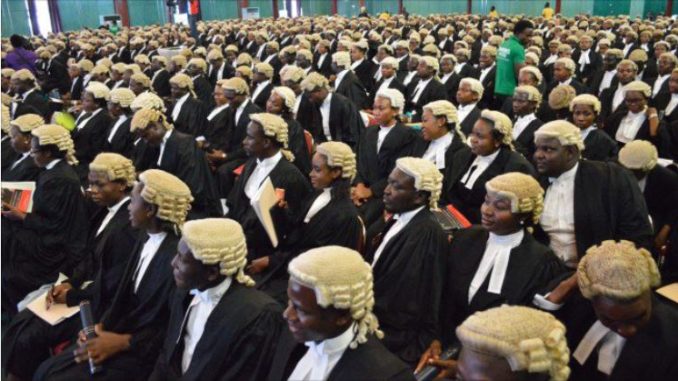
Practicing lawyers should take more than a passing interest in the ongoing matter between Paul Usoro, Senior Advocate of Nigeria (SAN) and the Economic and Financial Crimes Commission (EFCC). Although the case is currently in court and therefore subjudice, there are several underlying issues regarding the matter that should not only interest those who have a stake in the legal profession but should also be of paramount concern to them.
A cursory look at the case immediately throws up four key issues, namely: Client-Lawyer Privilege, Client-Lawyer Contractual Relationship, Who Regulates Legal Fees and Criminalization of Lawyers’ fees. However, it will be beneficial to highlight the EFCC allegations against Paul Usoro vis-à-vis a succinct contextual analysis.
EFCC’s allegations against Paul Usoro relate to converting to personal use, concealing the source of, disguising the origin of and retaining in his account sums of money to the tune of billions of naira belonging to the Akwa Ibom State government. EFCC said Usoro committed the alleged offences in 2015 and in 2016. The commission also said Usoro was paid with Awka Ibom State’s funds for legal services he rendered in his personal capacity to Udom, who was then a governorship candidate but is now a governor.
Essentially, the EFFC allegations are twofold: the first is that the Commission questioned Usoro in respect of a N300m cash inflow that came into his company’s Zenith Bank account on 14 March 2016 and the subsequent outflows from the account to various Senior Counsel between 22-23 March 2016.
The second borders on the EFCC’s wish to know the basis for the aggregate inflow of N1.1bn, paid in 4 tranches, into Usoro’s Firm’s Access Bank Account from Akwa Ibom State Government between 24th August 2015 and 18th September 2016.
Regarding the first allegation, Usoro maintained that the inflow was payment by Governor Udom Emmanuel in respect of an Election Petition Appeal that was determined by the Supreme Court and that he served as the coordination Counsel in respect of the matter and had engaged various Senior Counsel on Emmanuel’s behalf. He also noted that the subsequent outflows, which were made through bank transfers were the professional fees, which he made on Emmanuel’s behalf to those Counsel based on the N300m inflow. Usoro also insisted that the lodgment was made at the instance of Governor Emmanuel (albeit, not necessarily by him).
On the second allegation, Usoro explained that the payments were made by the Akwa Ibom State government in respect of several dispute resolution matters that he was handling for the State Government.
Countering Usoro’s defense, the EFCC has asked for letters of instructions or a contract document from Akwa Ibom State Government, asking Usoro’s Law firm to undertake the dispute resolution matters on behalf of the State Government. The EFCC is also demanding a scientific basis on which Usoro arrived at his supposedly hefty fees paid by the Akwa Ibom State Government.
In all of these, the EFCC is accusing Paul Usoro of using his law firm as a conduit to launder money for politicians. Usoro has, however, continued to maintain his innocence and should have his day in court on the 17th of April, 2019.
Without prejudice to the court hearing, it is important to briefly examine the four issues highlighted in the beginning of the article and the implications for stakeholders in the legal profession. The first is Client-Lawyer Privilege. It has judicially and historically been acknowledged that issue of fees, as between a lawyer and his client, is a matter of privilege. The recent decision of the Court of Appeal that was delivered on the 14 June 2017 in Appeal Number, CA/A/202/2015: Central Bank of Nigeria V Registered Trustees of the Nigerian Bar Association & Attorney General of the Federation affirmed this position. So, by questioning lawyers on the legitimate fees that they have earned from clients, the EFCC is breaching the lawyer-client privilege and showing complete disregard for the judgments of the Courts in this regard.
Client-Lawyer Contractual Relationship: The fees that are paid by a Client to his lawyer is not only a matter of privilege but is also contractual. As we all know, non-parties to a contract are complete strangers thereto and lack the locus standi to question and/or determine the propriety of such contract. The EFCC stands in that position is this and other matters of this nature; it lacks the locus standi to question the basis of the fees. Only the parties to the contract can question the justification for the fees and in this instance, neither party has raised any such query. Indeed, neither party reported the matter to the EFCC or invited the Agency to carry out any investigation thereto.
Who Regulates Legal Fees: There is no provision in Nigeria’s statute books that constitutes the EFCC into the auditor of legal fees. When the EFCC arrogates to itself the right to determine the basis for a lawyer’s fees, it not only intrudes into a client-lawyer contract, which by its nature is privileged, but also constitutes itself into an auditor of lawyers’ fees. No such position has been created in our statute books for the EFCC or any other agency for that matter.
Criminalization of Lawyers’ Fees: In his address at the Nigerian Bar Association National Executive Committee (NEC) Meeting held at the NBA Secretariat in Abuja in December, 2018, Usoro had noted the case of Chief Mike Ozekhome, SAN, when the EFCC attempted to forfeit his fees on the pretext that the funds came from illegal sources. “The allegations of the EFCC against me are not any different, particularly in regard to the N300 million which was paid by Governor Udom Emmanuel to my Firm’s account for the benefit of his Counsel in the Election Petition Appeal.
“If these EFCC incursions are not checked, the Bar and the practice of our profession are doomed,” Usoro stated.
Indeed, it is critical for lawyers to take a stand and protect the legal profession.
END

Be the first to comment